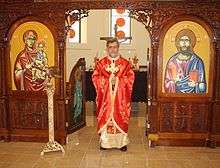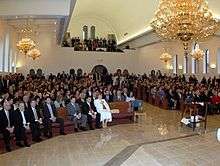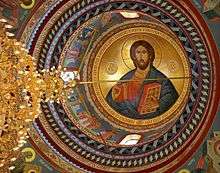Macedonian Orthodox Cathedral of the Dormition of the Virgin Mary (Reynoldsburg, Ohio)
| Dormition of the Virgin Mary | |
|---|---|
|
The new church building of St. Mary Macedonian Orthodox Church | |
| Location |
400 S. Waggoner Rd. Reynoldsburg, Ohio 43068 |
| Country |
|
| Website | macedonianchurch.org |
| History | |
| Founded | 1958 |
| Administration | |
| Diocese | American-Canadian |
The "Macedonian Orthodox Cathedral of the Dormition of the Virgin Mary" (Macedonian: Македонска Православна Kатедрала „Успение на Пресвета Богородица“, (Рејнолдсбург, Охајо)), also known as "St. Mary" (Macedonian: Пресвета Богородица), is a Macedonian Orthodox Church located in Reynoldsburg (Columbus area), Ohio. It is one of the oldest Macedonian Orthodox communities in the United States and in the American-Canadian Diocese.[1]
History




The very first beginning of Macedonians immigrating to USA date well back in the years around 1880s, according to the documents in the Ellis Island immigration records. At that point, their numbers were almost insignificant. The first large group of Macedonian immigrants came from, at the time (second half of the 19th and first decade of 20th centuries) Western Macedonia notably around Bitola, Prespa regions and the north of what is today Greek Macedonia, and it is estimated that around 50,000 Macedonians emigrated to the US between 1903 and 1906, but the outbreak of the Balkan Wars and World War I stopped the flow. Around 20,000 remained in the US and the rest returned home. The immigrants were predominantly peasants, with the remainder including craftsmen, workers and intellectuals. Immigration restarted after the wars; most of the new immigrants were ethnic Macedonians from Greece. Around 50,000-60,000 Macedonians had emigrated to the US by the end of World War II. The aftermath of the war led to a fresh round of Macedonian immigration, primarily from Greece, as a consequence of the Greek Civil war of 1946-49, approx. 70,000 emigrated to Canada, Australia, the US and other European countries. After Yugoslavia liberalized its emigration policies in 1960s, another 40,000 Macedonians emigrated during the period 1960-77. Most have been economic migrants rather than political dissidents.
In 1914, fewer than two thousand Macedonian Americans resided in Ohio.[2] Most Macedonians settled along Lake Erie, especially in Cleveland, where they found low-paying jobs in factories or worked as day laborers, but the majority of Macedonians who came to Ohio settled in Akron, Cincinnati, Lorain, Canton, Massillon, and Columbus. The great exodus after bloody partition of Macedonia during two Balkan wars and World War I, marked a corner stone in efforts to organize independent Macedonian Society here in Central Ohio. Being unrecognized and disrespected by the other ethnic or religious organizations of the neighboring nations, Macedonians have decided to organize themselves into “The Macedonian American Society Alexander The Great” in Columbus, Ohio, organized March 9th, 1938. In the Preamble of By-Laws they have stated their unity: We Macedonians from Macedonia, part of the former Turkish empire…
Long before the Macedonian Orthodox Church was declared autonomous, early Macedonian immigrants and their descendants founded churches that after were built and consecrated came under the jurisdiction of the Bulgarian Exarchate, the Serbian Patriarchate or the Ecumenical Patriarchate. In 1958, the Macedonian Orthodox Church was granted her autonomy, and during the same year members of the Macedonian community of Columbus submitted an application to the State of Ohio to establish a new church under the jurisdiction of the autonomous Macedonian Orthodox Church.[3] Early church trustees were Theodore Pashovich, Petar Christoff, and Velo Bozhin, with Andon Stoicheff as the first president of the Church Committee. The parish was organized on September 17, 1958 as the oldest parish of the Macedonian Orthodox Church in America.[4] On December 25th the same year first Holy Liturgy in Macedonian language conducted by Macedonian priest Fr. Stevan Beličeski was held in the Church Hall of the Society on 794 S Front Street, Columbus. In 1960, a property was purchased and the church building was finally completed in 1965. Few years later, on the corners of S. Napoleon Ave and Medway in Whitehall, OH the new cornerstone of the history of Macedonian Church and Community in Central Ohio was laid. Building of the Macedonian Orthodox Church “Dormition of the Most Holy Birth giver of God” started on August 30, 1964 with ever inspiring Faith and Hope and Love and Patience of hard working American-Macedonians. Next year 1965, on May 9, Church was dedicated and consecrated by the first Archbishop of the restored ancient Archbishopric of Ohrid in the name of the Macedonian Orthodox Church, His Beatitude Dositej.
The following 50 years paved the way to what the parish become today. Through numerous engagements in the Community, Macedonians in Central Ohio have integrated themselves in the American society. Numerous veterans from foreign wars, successful businessmen, sportsmen, and above all-hard working man and women from Macedonian-American Community are good example of that. In organizing and successfully conducting sports events, folk dances, Macedonian Language School, Sunday School, Church Choir etc., the impact of the Macedonian-American Community continues to grow.
Having broader family at some point of time requires broadening ones existing home or building another one. The family of the Macedonian Community in Columbus constantly grew in numbers and achievements. After several extensions of the Church and the Church hall in Whitehall in the seventies and eighties were completed, the need for more space rose again. Finally, decision to build the new Church and whole new Macedonian Culture Center was made. Beginning of the new century, the new Millennium marked the start of the new Church on 400 South Waggoner Rd in Reynoldsburg, OH. In 2003, the parish community purchased a new 14-acre (57,000 m2) property just east of Columbus in Reynoldsburg. A new church was built along with banquet hall facilities.
In the fall of 2006 Macedonian Community was struck by unexpected temptation-in an act of arson the old Church in Whitehall burnt almost to the ground. Following Holy Liturgies were held in the Church hall, with congregation holding their tears, in constant prayer to God our Lord and His Most Holy Mother, and in search for the right way to turn events in our favor. And so, as many times before in our history Macedonians have sang their old song, song of persistence, song of salvation, song of Faith. The very next month after the fire, on October 22, 2006, the dedication and consecration Liturgy for our new Church was celebrated, preceded by the relocation of the holy relicts of Saint Clement of Ohrid, from the Holy Altar of the old to the Holy Altar of the new Church and with participation of Archbishop of Ohrid and Macedonia, His Beatitude Stefan, Metropolitan Metodij of American-Canadian Diocese, and Metropolitan Kiril of Polog and Kumanovo Diocese, numerous priests of the American-Canadian Diocese of Macedonian Orthodox Church, in presence of multitude of the faithful.
Church Name
The parish was consecrated as "Makedonska Pravoslavna Crkva Uspenie na Presveta Bogorodica" (Macedonian Cyrillic: Македонска Православна Црква „Успение на Пресвета Богородица“), in honor of the Great Feast of the Dormition of the Mother of God in the Eastern Orthodox Church. The feast commemorates the "falling asleep" or death of Mary, the Mother of Jesus (literally translated as God-bearer, or Birth-giver), and her bodily resurrection before being taken up into heaven. Roman Catholic churches also celebrate the Great Feast of the Assumption, which commemorates the same event from a Roman Catholic perspective.
Orthodox parishes named in honor of the Great Feast of the Dormition generally use a naming convention that contains either "Dormition of the Mother of God", "Dormition of the Theotokos" or "Dormition of the Virgin Mary" in their formal names. The Macedonian language version of the parish name has always followed this naming convention, although throughout most of its history the parish was officially registered and known as the "St. Mary Macedonian American Eastern Orthodox Church". There are a total of four great feasts honoring the Mother of God in the Orthodox faith: The Dormition, the Nativity of the Theotokos, the Presentation of the Theotokos, and the Annunciation. Because "St. Mary" can be used to represent any of the four feasts, it was felt that the existing name did not convey the correct meaning to the general public. For these reasons, the parish council voted to change the parish's corporate name so that it is consistent with accepted naming conventions. When the parish consecrated its new building in 2006, building signage was installed emphasizing the formal version of the parish name and reads "Macedonian Orthodox Cathedral of the Dormition of the Virgin Mary".
Parish members continue to refer to the parish using the "St. Mary" name because of sentimental reasons, its long history of use and ease of use. For these reasons, the building monument sign also contains a reference to "St. Mary". The parish also continues to maintain a registration for the former name.
Services and Liturgy

The Parish belongs to Vicariate of the Mid West of the American-Canadian Macedonian Orthodox Diocese of the Macedonian Orthodox Church - Ohrid Archbishopric. Divine Liturgies are celebrated every Sunday, on the Twelve Great Feasts of the Orthodox Church and numerous Saints Feasts, as well as during the Holy Week (or Week of the Passions of Christ). Depending on what is prescribed by the Typicon, the Divine Liturgy of St. John Chrysostom, or Divine Liturgy of St. Basil the Great, or Liturgy of the Presanctified is celebrated. Macedonian Orthodox Church is following the Julian Calendar or so called Old Calendar, both in Macedonian and the Dioceses and parishes of the Diaspora. All Church services are presided and celebrated by the Dean of the Cathedral, the Archpriest, Very Rev. Dusko Gorgievski (Протоереј-ставрофор Душан Ѓорѓиевски) and sub-decon Gorgi Gurcinovski (ипоѓакон Ѓорѓи Ѓурчиновски). The Divine Liturgy begins promptly at 10:30 AM and last until noon. In addition to the service, a Sunday school is also provided. There, the priest gives a lesson on the Holy Scriptures or Holy Tradition topics every Sunday before he starts the service and from then on, the children will learn how to write and speak Macedonian language for those who do not know how to.
Iconography and Frescopainting

In the Fall of 2008, the parish began work on frescoes that were to be painted on the interior sanctuary walls. The work was done by Archpriest Fr. Theodore Jurewicz, from Erie, Pennsylvania, priest of The Church of The Nativity of Christ, a parish of the Old Believers within the ROCOR (Russian Orthodox Church Outside Russia). He spent 6 weeks working on the Christ Pantocrator with the help of a group of helpers from Ohio, Oregon, Montana and few Romanian Orthodox nuns. Today, there is still much progress to be done, but inch by inch, the parish is covering the walls.
As of April 2013, Fr. Theodore has completed the eastern part of the church (including the whole Holy Altar area, main dome and the pandentifs), the entrance porch (so called exo-narthex) and one fresco composition on the western gallery, the one of the patron-feast "Dormition of the Most Holy Birth-giver of God" (donated by the youth organization-"Macedonian Orthodox Philanthropic Society of Columbus"-MOPS). In this, he has depicted many important and traditional frescoes. For example, on the far wall of the altar is the most holy Theotokos, or the icon, Our Lady of the Sign also known as "more spacious than the heavens" (Greek: Πλατυτέρα των Ουρανών [Platytera ton ouranon]). In addition to this, he has also depicted The Ascension of Jesus and the Feast of the Pentecost is also depicted. Fr. Theodore is the author of the completely all-new icons of the iconostasis.
Gallery
Footnotes
- ↑ "American-Canadian Macedonian Orthodox Diocese". Archived from the original on July 11, 2014. Retrieved 14 September 2014.
- ↑ "Macedonian Ohioans - Ohio History Central". Retrieved 14 September 2014.
- ↑ Corporate Records of the Ohio Secretary of State
- ↑ Corporate Records of the Ohio Secretary of State
External links
- Official website
- Official Website of the American-Canadian Macedonian Orthodox Diocese
- Official Website of the Macedonian Orthodox Church
| ||||||||||||||
